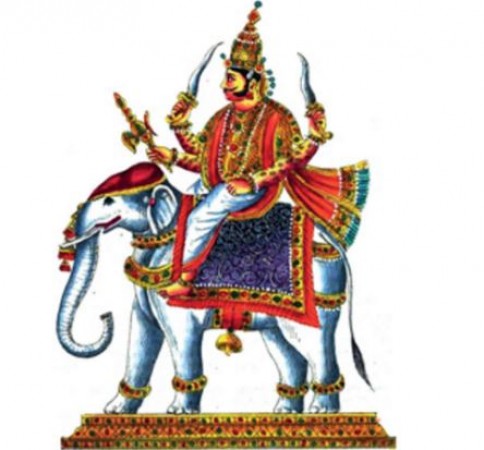
Indra Dev, also known as the King of the Devas, is one of the most prominent gods in Vedic mythology. He holds a significant position in the Hindu pantheon and is associated with thunder, lightning, rain, and storms. As an embodiment of power and strength, Indra plays a pivotal role in numerous ancient Vedic texts and is revered for his leadership, courage, and divine attributes.
In Vedic literature, Indra is depicted as a mighty warrior god who wields the thunderbolt, known as Vajra, as his weapon. He is often depicted riding a white elephant called Airavata, which symbolizes his majesty and authority. Indra's abode is believed to be in Svarga (heaven), atop Mount Meru, where he presides over the divine realms.
Also Read: The Enigmatic Color-Changing Shivling at Achaleshwar Mahadev Temple
Indra is described as a fearless and valorous deity who protects the gods and humans from various threats, including demons and evil forces. He is revered as the guardian of dharma (righteousness) and is known for upholding moral order and justice in the universe. Indra is also credited with maintaining the cosmic balance and ensuring the proper functioning of the natural elements.
One of Indra's significant roles in Vedic mythology is as the bringer of rain. He controls the monsoons, bestowing fertility upon the earth and enabling the growth of crops and vegetation. As the god of rain, Indra is celebrated as a benevolent deity who nourishes the land and sustains life.
Also Read: Know, "The method, importance and benefits of offering oil to Shani Dev"
Indra's exploits and battles against various adversaries are chronicled in the Rigveda, one of the oldest sacred texts of Hinduism. He is often portrayed as leading the gods into battle against the asuras (demons) and emerging victorious through his divine might and strategic prowess. These legends highlight Indra's bravery, intelligence, and divine intervention in ensuring the triumph of good over evil.
Despite his power and authority, Indra is not without flaws. He is occasionally depicted as succumbing to arrogance and pride, leading to his downfall. Vedic texts narrate instances where Indra becomes intoxicated by his position as the king of the gods, causing him to lose his divine stature temporarily. However, he eventually learns humility and regains his rightful place through penance and guidance from the sages.
Also Read: ancient devotional and spiritual story of jnaiye tungnath mahadev temple
Indra's worship was widely prevalent during the Vedic period, and many hymns and rituals were dedicated to him. Devotees sought his blessings for prosperity, protection, and success. As the supreme deity in the Rigveda, Indra was revered as the embodiment of strength and a guardian of divine order.
As Hinduism evolved, Indra's prominence gradually diminished, and he became less frequently worshipped. Deities like Vishnu and Shiva gained more prominence in mainstream Hinduism. Nevertheless, Indra's significance in Vedic mythology remains intact, and he continues to be revered as an important god in Hindu religious and cultural contexts.
Also Read: Rishikesh: A Spiritual Haven by the Holy Ganges
Indra Dev holds a vital position in Vedic mythology and Hinduism. As the King of the Devas, he embodies power, courage, and leadership. Indra's role as the god of thunder, lightning, rain, and storms highlights his association with natural elements and his responsibility to maintain balance and order in the universe. Despite his occasional flaws, Indra's tales of valor and divine intervention continue to inspire and captivate devotees, underscoring his enduring importance in Hindu religious traditions.
Mystical Mahadev Temples to Explore During the Auspicious Month of Sawan
Mysteries of Stambheshwar Mahadev Temple: Disappearing Marvel and Mythical Legends